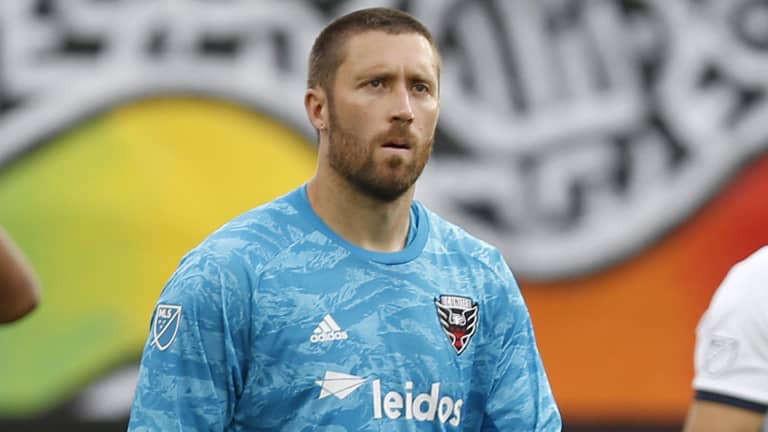Last season wasn’t the first time Chris Seitz had a coaching staff challenge him to meet aggressive fitness goals. Far from it.
“I’ve always been a big boy,” the goalkeeper told MLSsoccer.com via phone on Wednesday. “This is my body type, this is my genetics. This is who I am.”
Seitz’s 15-year professional career took him to the 2008 US men’s Olympic team (the last to successfully qualify), five different MLS clubs as well as a handful of USL sides on loan, and it wasn’t uncommon for him to be assigned goals like shedding a few pounds or trimming his body-fat percentages, especially during preseasons.
What he experienced during his final season with D.C. United was something altogether different, as he explained with riveting honesty and transparency in a series of tweets posted on Tuesday.
"I was in a dark, dark place"
The rigorous regimen installed by former coach Hernan Losada, with an obsessively exacting approach to body weight, body fat percentages and cardiovascular output, became a dominant storyline in D.C.’s 2021 campaign – and pushed Seitz, and at least a few of his teammates, to the brink.
“I was in a dark, dark place last year,” Seitz said. “And I know for certain I’m not the only one.”
Seitz is no softy. He’s dealt with depression and anxiety before. In 2012 he showed uncommon courage to put his soccer life on hold and become a bone marrow donor, a selfless and physically taxing act – not to mention the resilience to regain his fitness and form afterward – that saved the life of a stranger and led to an MLS Humanitarian of the Year award.
As demanding as it was, he bought in completely to the new project in D.C. Then that fallout from a seemingly innocuous Instagram post paying tribute to his wife Katie on Mother’s Day plunged him back into the depths.
It can’t have helped that it coincided with Losada’s decision to bench him after he’d opened the season with four straight starts in goal for United, with Bill Hamid sidelined by injury. Those would turn out to be Seitz’s final appearances in MLS. Even dropping some 10% of his body weight didn’t seem to lift his standing.
He found himself paying a heavy price in his personal life as his pursuit of further gains affected his relationships with family and friends. Perhaps most frustrating was the sense that – even in soccer’s statistics-driven modern context – there wasn’t a robust scientific case justifying the numerical demands being imposed so much as just one person’s personal insistence.
“I’ll take it one step further,” said Seitz. “Sometimes coaches just get stuck on what their idea of a player should look like or be like. And we’re missing out on talented players in this country because of this. I’ve seen it.”
For Seitz, who turned 35 in March, this isn’t about Losada or anyone else on his staff so much as the vital importance of mental health in a profession where players endure more physical, psychological and emotional stress than ever, even as awareness grows about those insidious dangers and crippling effects beyond the field.
He’d found himself at a point he’d always dreaded: “When playing the game felt more like work,” he said.
Paradigm shift?
After his contract expired at year’s end, he had free-agency options elsewhere. But with Katie having just launched an interior decorating business and their five young children at home, “it felt like the right moment” to hang up his cleats and start the next chapter.
Seitz announced his retirement in January, and he’s taking postgraduate coursework and doing some coaching of his own kids as he eyes new beginnings.
He recognizes that this has given him enough distance from the locker room to speak freely in ways that many of his former colleagues cannot.
That’s a big factor in his decision to share his experiences publicly, in the hope of advancing the wider conversation about mental health in the game. He’s gotten positive feedback from fans and players – including some D.C. teammates – and hopes the paradigm is slowly shifting in a positive direction.

“Teams spend so, so much on players’ [physical] fitness and performance,” said Seitz, “and the mental side of it really needs to be included in that, too.”
He points to approaches like Pete Carroll’s at the Seattle Seahawks, where player wellness has a holistic outlook that normalizes the topic and places the psyche on par with any other part of the body that needs to be trained and cared for.
“I can only speak for myself, but by nature athletes are perfectionists, right?” said Seitz. “So with that for me came obsessions over aspects of the job both on and off the field. Having someone whose only goal is to put that into frame and help players use it for better and not for worse can make a massive impact on performance, and tap into new levels for players.”












